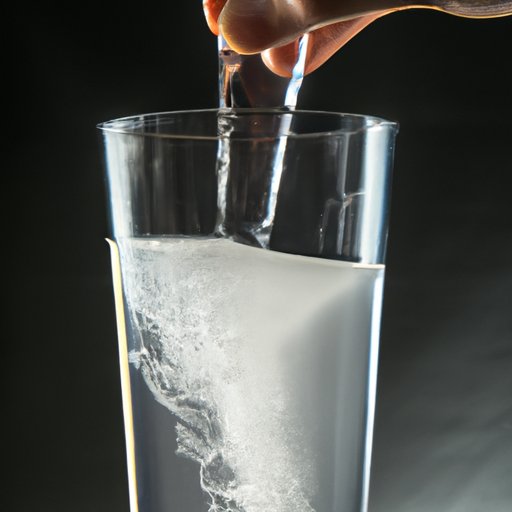
I. Introduction
Intermittent fasting is famed for its health benefits, aiding weight loss, boosting metabolism, and reducing inflammation.
A. Explanation of the problem
However, there is a misconception about whether drinking water is allowed during a fast. Does consuming water ruin your fast? Would you still benefit from the fasting process even if you drink water? This article aims to explore the science behind water fasting, its benefits and risks, and debunk common myths around drinking water while fasting.
B. Purpose of the article
This article aims to address some of the most common concerns related to drinking water while fasting, providing readers with science-backed information that helps them make informed decisions about how to conduct their fasts. Furthermore, it intends to shed light on the benefits of water fasting and its impact on overall health.
C. Brief overview of the topics that will be covered
We will first explore the science behind water fasting, discussing its effects on metabolism and hunger. We will then move on to discuss intermittent fasting and the rules surrounding it to determine whether water consumption breaks a fast. Next, we’ll learn tips for successful water fasting, including how to ensure you are drinking enough water and ways to avoid dehydration. We will then examine the benefits and risks of drinking water while fasting on overall health. Finally, we’ll delve into the difference between water fasting and dry fasting and debunk myths surrounding water fasting.
II. The Science Behind Water Fasting: What Happens to Your Body When You Drink Water During a Fast
A. Definition of water fasting
Water fasting is when someone refrains from consuming any type of food or drink except water for a specific period.
B. How water fasting affects metabolism
During water fasting, the body enters a state of ketosis, where it switches from burning glucose to burning fat for energy. This metabolic shift results from the body’s depleted glucose stores, leaving it with no other choice than to start using fat as an energy source.
C. The role of water in reducing hunger
Water can help curb hunger during a fast because it fills up the stomach and gives the sensation of fullness. The body interprets that signal as satiety, reducing the brain’s hunger center’s activation and curbing your appetite.
D. Effects of drinking water on the Autophagy process
Autophagy is the body’s natural process of ridding itself of damaged cells, recycling them, and producing new ones. This process helps to keep cells healthy and functional. Drinking water won’t stop the autophagy process during the fast; it could even improve the process’s efficiency by flushing toxins out of your body.
III. Breaking the Fast: Is Drinking Water Allowed During Intermittent Fasting?
A. Different types of intermittent fasting
Intermittent fasting involves short periods of fasting with some calorie intake in between. There are various types of intermittent fasting, such as the 16/8 method, where an individual fasts for 16 hours and eats during an 8-hour window. The 5:2 diet involves five days of normal eating and two non-consecutive days of consuming only 500-600 calories.
B. Rules surrounding intermittent fasting
Drinking water does not break the fast, according to most experts. For example, you can consume plain water and a moderate amount of black coffee without any added sugar, milk, or creamer and still sustain a beneficial fast. However, nutritional supplements, electrolytes, or proteins can break the fast.
C. Whether or not drinking water breaks the fast
Drinking water does not break the fast, as the body needs and craves liquids when deprived of food for a long time. Moreover, water helps the body detox and promote healing, which is the main objective of fasting.
D. Expert opinions about drinking water during intermittent fasting
Most experts agree that drinking water while fasting is essential to sustain the body without any complications. It not only provides hydration but also helps to ensure the balance of electrolytes and minerals in the body that are necessary for optimal health.
IV. Tips for Successful Water Fasting: How Drinking Water Can Help You Stick to Your Fast
A. Importance of drinking water while fasting
Drinking water is essential during the fast because it helps to flush out toxins, keeps the body hydrated, and promotes satiety that can help you stay on track when feeling lethargic or hungry.
B. How to make sure you’re drinking enough water
A general rule of thumb is to drink at least 8 cups of water daily or an ounce of water per pound of body weight, whichever comes first. It’s advisable to find a balance that works for your body.
C. Ways to avoid dehydration during a water fast
Avoid strenuous physical activity and opt for low-intensity exercise to avoid sweating too much. You can also consider sipping water frequently to keep your body hydrated.
D. Expert advice on ensuring a successful water fast
Experts recommend easing into the fast and ensuring you stay hydrated throughout. It’s also crucial to listen to your body and identify warning signs like dizziness or fatigue, and break the fast if needed.
V. Hydrating for Health: The Benefits and Risks of Drinking Water While Fasting
A. Health benefits of drinking water during a fast
The primary benefit of drinking water during a fast is maintaining hydration. Furthermore, studies have shown that water fasting could have potential benefits such as reducing inflammation, promoting cell regeneration, and aiding weight loss.
B. Risks associated with drinking too much water while fasting
Drinking too much water while fasting can lead to overhydration, which can be dangerous. Possible symptoms include nausea, headaches, and exhaustion.
C. Expert opinion on the benefits and risks of drinking water during fasting
Most experts agree that drinking water while fasting is beneficial and necessary for optimal health. However, it’s crucial to ensure that you don’t overhydrate as this can lead to potentially harmful health complications.
VI. The Role of Water in Fasting: From Improving Digestion to Boosting Energy
A. How drinking water improves digestion
Drinking water can boost digestion by ensuring that the digestive system keeps humming along, even when you’re not consuming food. It can help lubricate the intestines and prevent constipation.
B. Water’s role in flushing out toxins
Water is essential in the process of eliminating toxins and waste products from the body. During water fasting, the body’s natural processes are optimized, resulting in the flushing out and elimination of toxic substances from the body.
C. The effect of water on energy levels during a fast
Drinking water can help you maintain energy levels during a fast. It helps to prevent dehydration, providing the body with the necessary hydration for optimal energy and cognitive function.
D. Expert opinion on water’s role in fasting
Experts agree that water plays a crucial role in fasting, helping to promote optimal health and overall wellbeing. By keeping hydrated and ensuring electrolyte balance, you can sustain a successful fast without negatively impacting your health.
VII. Water Fasting vs. Dry Fasting: Exploring the Differences in Health Benefits and Risks
A. Definition of dry fasting
Dry fasting involves abstaining from all fluids, including water, for a certain period. The body relies solely on internal water stores, meaning that when fasting, there is no intake of liquids whatsoever.
B. How dry fasting differs from water fasting
The fundamental difference between dry fasting and water fasting is that in dry fasting, no water is consumed, while in water fasting, only water is consumed. Dry fasting is considered more intense than water fasting because it pushes the body to rely on its internal resources, leading to more rapid detoxification.
C. Health benefits and risks associated with dry fasting
Dry fasting can help to speed up the detox process, promote autophagy, and aid weight loss. However, there are risks associated with dry fasting, such as dehydration, kidney damage, and reduced muscle mass. Dry fasting should only be undertaken with caution and under the supervision of a healthcare professional.
D. Expert opinion on the differences between water fasting and dry fasting
Most experts agree that water fasting is an excellent way to stay hydrated and promote optimal health during a fast. However, dry fasting should only be attempted under professional surveillance as it has more risks and requires a more nuanced approach than water fasting.

VIII. Dispelling Myths About Water Fasting: Debunking Claims That Drinking Water Ruins Your Fast
A. Common myths about drinking water while fasting
Some common myths surrounding drinking water when fasting include that drinking water ruins the fast, that it hinders weight loss, and that it can interfere with autophagy.
B. The truth about how water affects your fast
Drinking water does not ruin the fast, hinder weight loss, or interfere with autophagy. In fact, water is essential during fasts, helping to promote digestion, reduce hunger, and promote hydration.
C. Expert opinion on dispelling myths about drinking water during fasting
Most experts agree that drinking water during fasts is essential and does not ruin the fasting process in any way. On the contrary, it can help sustain the fast and lead to better overall health outcomes.
IX. Conclusion
of the topics discussed
We have explored the science behind water fasting, its benefits and risks, and whether or not drinking water is allowed during intermittent fasting. We have also learned tips for successful water fasting, the benefits of drinking water during a fast, and how water plays a crucial role in improving digestion, boosting energy and promoting health. Finally, we debunked common myths about water fasting and provided an overview of the difference between water fasting and dry fasting.
B. Final thoughts on drinking water while fasting
Drinking water during a fast is essential for maintaining hydration, boosting digestion, and promoting optimal health outcomes. It is crucial to keep in mind that drinking too much water while fasting can be harmful to your health, which is why you should find a balance that works for you.
C. Call to action for readers to try water fasting with the proper knowledge and guidance
We encourage readers to try water fasting with the proper guidance, understanding its benefits and risks, and hydrating enough throughout the process. As with any dietary change, it is advisable to consult your doctor beforehand, especially if you have underlying medical conditions.




